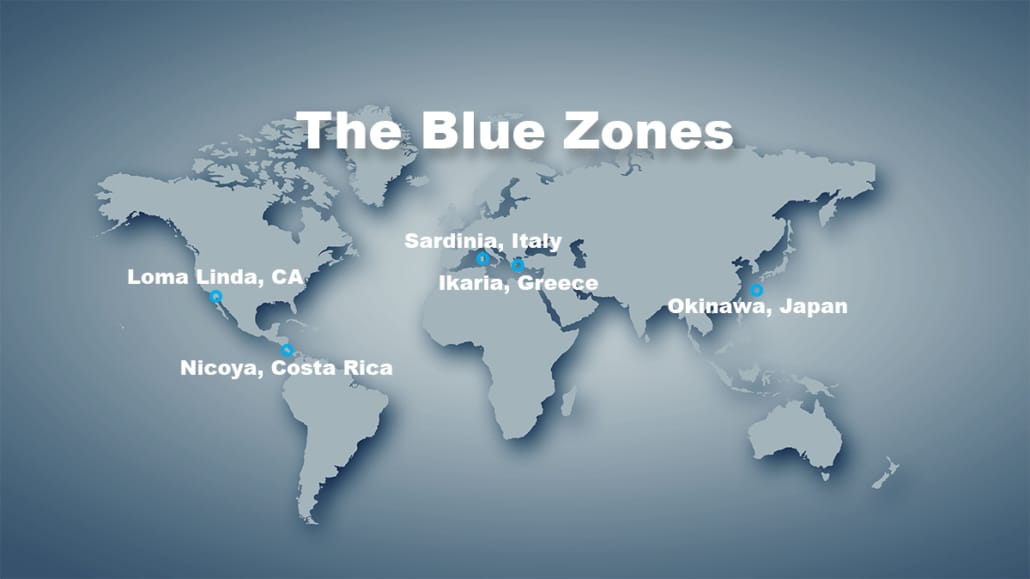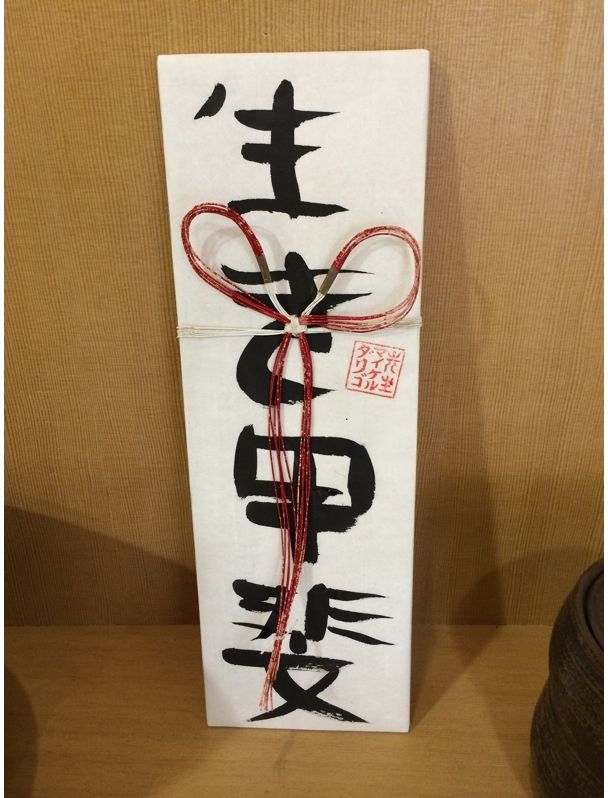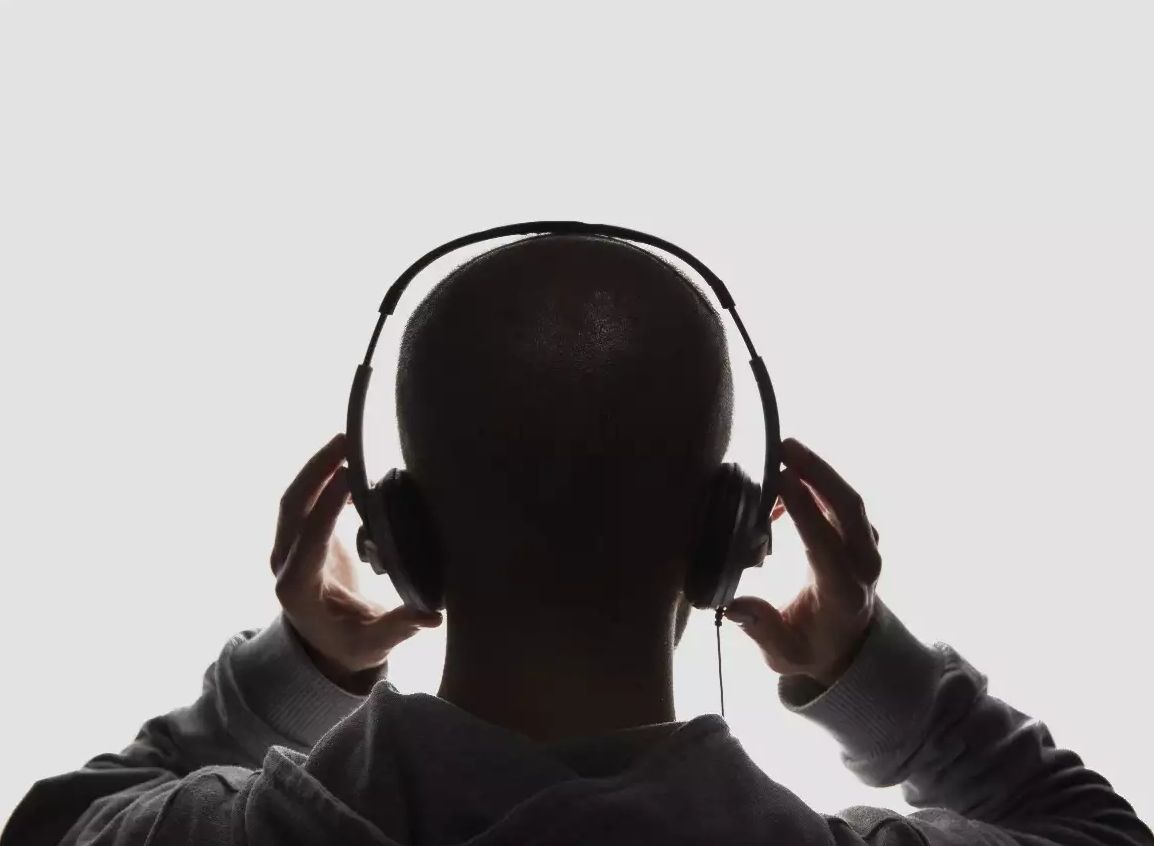To have a purpose for living is the true measure of a satisfied and rich life; rather than striving for happiness, strive for purpose. If any one concept is the secret to happiness and success, this is it.
Ikigai 生き甲斐 [pronounced "i-kih-guy"] is a four-kanji concept that literally means "purpose (or reason) for living." If any concept in karatedo holds the key to both happiness and a long, healthy life, it most assuredly is ikigai.
The Secret to Longevity
In studies of longevity around the world, researchers have tried to identify the key characteristics of long-lived people — especially those hardy individuals that live to one hundred years of age, or more.
Researchers have identified a few areas that exhibit the characteristic of a disproportionate number of long-lived men and women, and have named them "Blue Zones."

These areas are certainly not the only places where long-lived individuals reside; however, they are areas where scientists have studied the populations enough to determine there are measurable increases in longevity among the population.
[As an aside, it should be noted that these Blue Zones can be dynamic, responding to environmental and cultural changes. Their longevity advantages may be open to change and lessening based on those factors.]
It should come as no surprise that one of those areas is Okinawa, the birthplace of karatedō.
All of these areas tend to share three important characteristics. The first two are probably obvious: due to culture, terrain, or other factors, the inhabitants of Blue Zones have healthy diets (in the case of Loma Linda, California, about a third of the population are Seventh Day Adventists and are therefore vegetarians; in the other areas, the diet tends to be a so-called "Mediterranean Diet") and engage in daily exercise as part of their culture.
The third factor, though, is this: due to their culture, these long-lived, healthy, and active individuals live life with a purpose.
They have ikigai 生き甲斐.
Everyone has — and ultimately in fact, must have — a reason for living, a purpose for existence. Identifying it, refining our self-awareness of it, and then clearly communicating it to ourselves, however, can be challenging. Nonetheless, it is vitally important for our happiness and as well as our physical longevity that we do so.
Uniqueness of Purpose
Everyone’s ikigai 生き甲斐 is different — and is equally important. The elderly woman that cares for her great-grandchild has a deep and fulfilling purpose; the schoolchild that is his friend’s best friend is also fulfilling a deep purpose.
All ikigai are equally important and powerful, because all ikigai are, by definition, a reason for living for someone.

Ikigai can change, evolve, and transform throughout our lives. A young doctor might deeply identify and care about improving the health of her patients, and be passionate about this; later, the same now-older doctor may be passionate about being a mother to her children; and even later, may become passionate about teaching other doctors to be world-class caregivers to their patients.
Our ikigai evolves and transforms with us, just as much as the knowledge and identification of our ikigai transforms us. We push ourselves, we focus our attention, we nurture our strong spirit — all because we want to support and fulfill the roles that our ikigai demands. The elderly grandmother keeps strong, fit, and active, because she passionately must care for her great-grandchild. Being strong, fit, and active are simply means to an end: that end is her ikigai.
Purpose Outside Ourselves
Having noted that everyone's ikigai can be different, and equally effective and powerful for that purpose, it's important to understand that not all ikigai are equal.
To truly be powerful and effective, ikigai 生き甲斐 must be purpose that extends to others, not ourselves.
It is not enough (and some might even claim that it wouldn't be a true purpose) to want to be a rich man. That's potentially a goal, but it's not a purpose for living. Rather, if we use our riches to create a wonderful life for our children, or we use our riches to build a company that builds products or services that serve our community, then we have a purpose, and therefore, ikigai.
Do not confuse resources with purpose. Monetary riches, ownership of things, powerful positions – none of these are ikigai in and of themselves.
Ikigai must be a purpose in which we affect others. The grandmother taking care of her grandkids has ikigai. The grandmother trading stocks in order to accumulate enough money to buy more trinkets at the jewelry store does not.
The lesson here is simple: live for others, and you'll have a long and satisfying life. Live for comfort, riches, or convenience, and you'll have a life neither long nor satisfying.
How Do We Find Our Purpose?
It seems like it shouldn't be all that hard to find our purpose in life. But often this isn't the case.
Sometimes our goals masquerade as a purpose; other times, the momentum of daily life fools us into mistaking simple existence as the purpose of existence. Neither, of course, are ikigai.
It takes some time to determine one's purpose in life. And it's not only normal, but advantageous to have several purposes. (Again, though, don't mistake goals for purpose – no one can have a dozen ikigai, whereas a successful man or woman can have a dozen goals, easily.)
We are multifaceted individuals: we can find purpose in our families, in our professions, and in our communities. And those purposes can change and evolve as time passes and events occur. As we change, our purpose in life may change.
To find our ikigai takes some amount of serious thought and self-reflection. Look for the places in your life where you can have a profound effect on others, and that will help guide you. Consider your unique skills, circumstances, and resources.
And think deeply of what truly satisfies you. Within that, you'll find some major clues to your true purpose.
It is often said that ikigai is the intersection of your passion (what satisfies and motivates you, and brings you a feeling of accomplishment), your skills, knowledge, and resources, and most importantly, what the world around you actually needs. If you can determine that intersection, you probably have a good idea of what your ikigai 生き甲斐 is.
Purpose as Karatedō
As karateka, we are challenged to both define our ikigai, and to live it. To search out and identify what our central purpose for living is, and then to be strong and passionate in the living of it.
What we choose for our purpose often revolves around others – especially as karateka. The idea of service to others is inherent in the power of ikigai, and that's especially true for karateka.
As practioners and students and teachers of karatedō, we seek to lead and we seek to serve as a component of that leadership. That kind of commitment to service gives extra power and meaning to the ikigai of karateka.
In the end, though, it is that ikigai 生き甲斐 that powers our karatedo. And what gives karatedo so much power and purpose, in return.
| Kanji/Katakana | Meaning |
|---|---|
| 生き | living/alive (iki) |
| 甲斐 | worth of (purpose of) (gai) |
Editor's Note: This lecture was first delivered by Sensei in San Rafael, California in January 2014 as the official Kagami Biraki lecture of that year. (Read more about Kagami Biraki here.) However, this lecture is also delivered annually every January, as part of the Cycle of Four (read more about that set of meditation and shodo lectures here.)




![Ikioi — Momentum 勢い [Edition 2025]](https://images.unsplash.com/photo-1691568520168-d74572f43f62?crop=entropy&cs=tinysrgb&fit=max&fm=jpg&ixid=M3wxMTc3M3wwfDF8c2VhcmNofDYyfHxtb21lbnR1bXxlbnwwfHx8fDE3NDczNDY5MDJ8MA&ixlib=rb-4.1.0&q=80&w=720)
![Taikibansei — Great Talent, Evening Forming 大器晩成 [Edition 2025]](https://images.unsplash.com/photo-1534447677768-be436bb09401?crop=entropy&cs=tinysrgb&fit=max&fm=jpg&ixid=M3wxMTc3M3wwfDF8c2VhcmNofDIzfHxzaG9vdGluZyUyMHN0YXJ8ZW58MHx8fHwxNzQ0MTU3MTQzfDA&ixlib=rb-4.0.3&q=80&w=720)
![Gaden Insui — Pull Water to My Own Rice Paddy 我田引水 [Edition 2025]](https://images.unsplash.com/photo-1512117789060-5de1ecef9eb7?crop=entropy&cs=tinysrgb&fit=max&fm=jpg&ixid=M3wxMTc3M3wwfDF8c2VhcmNofDF8fHN0YW5kJTIwdXB8ZW58MHx8fHwxNzQzMzYwMTAzfDA&ixlib=rb-4.0.3&q=80&w=720)